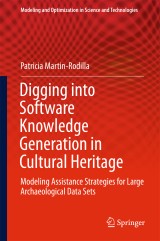Details

Digging into Software Knowledge Generation in Cultural Heritage
Modeling Assistance Strategies for Large Archaeological Data SetsModeling and Optimization in Science and Technologies, Band 11
|
96,29 € |
|
| Verlag: | Springer |
| Format: | |
| Veröffentl.: | 14.10.2017 |
| ISBN/EAN: | 9783319691886 |
| Sprache: | englisch |
Dieses eBook enthält ein Wasserzeichen.
Beschreibungen
<p>This book focuses on innovative strategies to manage and build software systems for generating new knowledge from large archaeological data sets</p><p>The book also reports on two case studies carried out in real-world scenarios within the Cultural Heritage setting. The book presents an original conceptual framework for developing software solutions to assist the knowledge generation process in connection with large archaeological data sets and related cultural heritage information— a context in which the inputs are mainly textual sources written in freestyle, i.e. without a predetermined, standard structure.</p><p>Following an in-depth exploration of recent works on the knowledge generation process in the above-mentioned context and IT-based options for facilitating it, the book proposes specific new techniques capable of capturing the structure and semantics implicit in such textual sources, and argues for using this information in the knowledge generation process.</p><p> </p><p>The main result is the development of a conceptual framework that can accommodate textual sources and integrate the information included in them into a software engineering framework. The said framework is meant to assist cultural heritage professionals in general, and archaeologists in particular, in both knowledge extraction and the subsequent decision-making process.</p><p></p><p></p>
Introduction.- Prior Research Design.- Existing Techniques and Tools.- Dealing with Archaeological Particularities.- Prior Empirical Results.- Framework Overview.- Archaeological Subject Matter.- Cognitive Processes.- Presentation and Interaction Mechanisms.- Integration, Interoperability and Consistency between Framework Models.- Analytical Validation: A Romea as a Case Study.- Empirical Validation.- Discussion.- Conclusions.
<p>This book focuses on innovative strategies to manage and build software systems for generating new knowledge from large archaeological data sets</p><p>The book also reports on two case studies carried out in real-world scenarios within the Cultural Heritage setting. The book presents an original conceptual framework for developing software solutions to assist the knowledge generation process in connection with large archaeological data sets and related cultural heritage information— a context in which the inputs are mainly textual sources written in freestyle, i.e. without a predetermined, standard structure.</p><p>Following an in-depth exploration of recent works on the knowledge generation process in the above-mentioned context and IT-based options for facilitating it, the book proposes specific new techniques capable of capturing the structure and semantics implicit in such textual sources, and argues for using this information in the knowledge generation process.</p><p> </p><p>The main result is the development of a conceptual framework that can accommodate textual sources and integrate the information included in them into a software engineering framework. The said framework is meant to assist cultural heritage professionals in general, and archaeologists in particular, in both knowledge extraction and the subsequent decision-making process.</p><p></p><p></p>
Presents innovative strategies to manage and build software systems for generating new knowledge from large archeological data sets Shows how to structure archeological information produced in research as a conceptual model Walks the reader carefully through each data-based ideological decision Guides the readers step by step to the implementation of an information technology (IT) system dealing with their own archeological information Offers a practical guide on IT applications to an archeologist working on site Includes supplementary material: sn.pub/extras
<p>Presents innovative strategies to manage and build software systems for generating new knowledge from large archeological data sets</p><p>Shows how to structure archeological information produced in research as a conceptual model</p><p>Walks the reader carefully through each data-based ideological decision</p><p>Guides the readers step by step to the implementation of an information technology (IT) system dealing with their own archeological information</p><p>Offers a practical guide on IT applications to an archeologist working on site <br/></p>

















